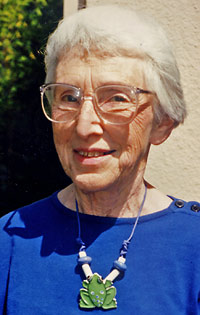UC Berkeley Web Feature
Harriet Nathan, campus editor and oral historian, dies at 85
BERKELEY – Harriet Nathan, a university editor and oral historian for nearly 40 years, died July 25 at age 85. She lived in Piedmont Gardens, an Oakland retirement community, at the time of her death.
 Harriet Nathan (Photo courtesy Ed Nathan) |
First as an editor with the Institute of Governmental Studies (IGS) - which, when she started work there in the 1950s, was called the Bureau of Public Administration - and then over the course of several decades with the Regional Oral History Office, Nathan, a 1941 Berkeley graduate, both observed a long chunk of university history and contributed substantially to its recording.
At IGS, between her arrival as an editor in the '50s and her last assignment there in 1987, she prepared public-affairs reports on a range of state and regional policy issues, from health and education to urban growth and Berkeley city politics. At ROHO she conducted dozens of oral histories, interviewing prominent Californians from the worlds of philanthropy, civic leadership, the arts, and higher education. Her subjects included five Berkeley chancellors as well as a number of other top UC and campus administrators.
Born in Seattle in 1920, Nathan moved to Oakland with her family at age 14. Following her graduation from Berkeley, she helped establish a woman's center on campus and was the first woman to serve as managing editor of the Daily Californian, the campus's student newspaper.
She met her future husband, Ed Nathan, while volunteering on a Senior Week committee. The two were married in 1942 and, several years later, moved into the Berkeley cottage where they would live for more than half a century.
After starting a family, Nathan returned to Berkeley to get a graduate degree in journalism. Already a fixture at IGS, in 1966 she began working another part-time job, in the oral history office. Ann Lage, an editor at ROHO who worked with Nathan for 30 years, describes her colleague as possessing "a keen interest and depth of knowledge in the arts, in government and civic service, and in the history of the university, all of which she put to use in her nearly 40 years with the oral history office."
Those diverse interests aided her as she interviewed nearly 50 subjects, including local philanthropists and civic leaders Harold Zellerbach, Daniel Koshland, Sr., and several members of the Haas family. Her strong interest in the arts served her in interviews with sculptor Ruth Asawa, graphic designer Wolfgang Lederer, and five fiber artists.
Over the course of 12 years Nathan interviewed Ewald Grether, the founding dean of Berkeley's business school - and so holds the record for the longest oral history produced by ROHO. As director of the University History Series she interviewed Deans of Women Mary Davidson and Katherine Towle and political scientists Joseph Harris and Thomas Blaisdell. She also developed the Chancellors series at ROHO, interviewing Edward Strong, Roger Heyns, Albert Bowker, Ira Michael Heyman, and Chang-Lin Tien.
In a book published in 1996 by IGS, Critical Choices in Interviews: Conduct, Use, and Research Role, Nathan created a valuable resource for oral historians, weaving together her experience as a journalist, researcher, and interviewer. She was also co-author, with Nancy Kreinberg, of Teachers' Voices, Teachers' Wisdom (Lawrence Hall of Science, 1991), in which seven instructors spoke at length about their pedagogical experience.
"She encouraged you to push your thinking farther and deeper and helped to bring out the best in both your writing and thinking," says Kreinberg of her friend and mentor. "That same skill made her a superb interviewer - someone who listened very carefully, did her homework, and knew when to probe and when to remain silent." On a personal level, recalls Kreinberg, she was "enormously funny, witty, and bright as hell: an absolute delight to be with. On top of that, she was such a good friend, a good listener, and strong supporter of all her friends - and she had lots of them. That kind of loyalty, sympathy, and supportiveness was very much a part of who she was."
In addition to work and family, Nathan's passions included reading, needlepoint, and eating raw oysters - the latter a connection to her Northwestern roots. She was also "very active politically," says Kreinberg, who recalls that Nathan founded the Berkeley chapter of the League of Women Voters. "She kept up with politics throughout her life and retained a keen interest in it until the end."
Nathan, who was awarded the Berkeley Citation, the campus's highest honor, in 2000, is survived by her husband; a daughter, Elinor Bernal of San Antonio; and two grandchildren. Her other daughter, Ann Nathan, died in 1995.
Harriet Nathan's ashes will be scattered at a beach she loved near Santa Cruz, say family members, with a memorial to be held in the spring. Donations may be sent in her memory to Planned Parenthood or a social-service agency of one's choosing.

